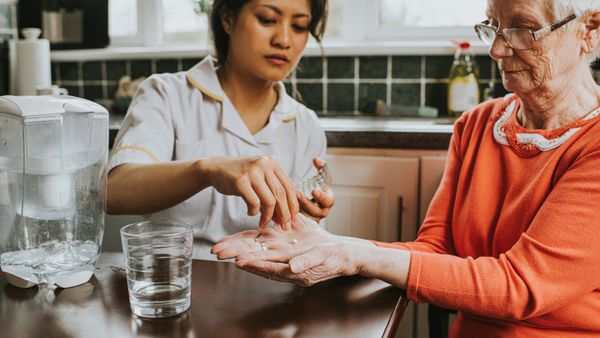Vitamins play an important role in virtually all the important events in the body, including the production of energy, hormones, enzymes, immune cells, and neurotransmitters (chemical messengers in the brain). Vitamins can be divided into two general categories: fat-soluble (A, D, E, and K) and water-soluble (the B's and C). It doesn't take much of any one vitamin to meet your needs.
While proteins, carbohydrates, and fats are measured in grams, vitamins are measured in milligrams (one-thousandths of a gram) micrograms (one-millionths of a gram), and International Units (an international standard of measurement that varies depending on the potency of the vitamin). But those microscopic amounts have powerful health-promoting properties. Although we tend to think of supplements when we talk about vitamins, food -- not supplements -- should be your primary source.
Fruits and vegetables are the primary sources of water-soluble vitamins and some fat-soluble vitamins (beta-carotene, which the body converts to A; E; and K). Fortified dairy products are the primary dietary source of vitamin D. Your skin also manufactures some vitamin D when exposed to sunlight, which explains its nickname: "the sunshine vitamin."
Getting adequate amounts of the following nutrients is especially important now that you're over 50:
Vitamin B2 (Riboflavin)
Vitamin B2 (Riboflavin)
Recommended Intake: Men: 1.3 milligrams a day; Women: 1.1 milligrams a day
This B vitamin makes it possible for your body to access energy from the food you eat, and it helps each of the body's cells produce its own energy. It also plays an important role in maintaining your vision and keeping your skin healthy. Riboflavin is required for the production of niacin, another B vitamin.
While the recommended intake for riboflavin doesn't actually increase with age, the fact that it stays the same while your calorie needs drop means that you have to make wise food choices to get enough riboflavin in your diet. Moreover, researchers suspect that you become more sensitive to riboflavin deficiencies with age.
Vitamin B6 (Pyridoxine)
Vitamin B6 (Pyridoxine)
Recommended Intake: Men: 1.7 milligrams a day; Women: 1.5 milligrams a day
Vitamin B6 helps new cells to develop and is an important participant in the production of the B vitamin niacin and the neurotransmitter serotonin. It boosts the immune system and helps to regulate blood sugar levels. Pyridoxine is also a member of the trio of B vitamins (B6, B12, folic acid) that help reduce your risk of heart disease by keeping blood levels of the amino acid homocysteine low. High levels of homocysteine have been linked with clogged arteries and heart disease.
As you age, your risk of developing a vitamin B6 deficiency increases. There are two reasons for that. First, older people generally consume less protein, which is the richest source of vitamin B6, so their diets are more likely to be low in it. Second, many older adults metabolize the vitamin more rapidly than they did when they were younger, increasing the need for it on a daily basis. Signs of severe vitamin B6 deficiency include skin problems, anemia, depression, confusion, and convulsions.
Vitamin B12 (Cyanocobalamin/cobalamin)
Recommended Intake: Men and Women: 2.4 micrograms a day
Vitamin B12 is critical for proper nerve and brain development and for the production of healthy red blood cells. If you don't get enough of this vitamin, mental functioning can diminish and balance and coordination can be impaired. A prolonged, severe deficiency of B12 that goes uncorrected can cause irreversible nerve damage.
A B12 deficiency usually is not caused by a lack of B12 in the diet. The vitamin is found in animal foods such as meat and liver, as well as in eggs, fish, and dairy products. Only strict vegetarians who don't eat dairy or eggs are at risk of a deficiency because of diet.
A B12 deficiency is usually the result of either pernicious anemia, an inherited disease in which the stomach lining stops producing a substance called intrinsic factor that is needed to absorb vitamin B12, or a lack of stomach acid, which is also fundamental to the absorption of the vitamin.
A decline in stomach acid, a condition called atrophic gastritis, is experienced by as many as 30 percent of people age 50 and older and by 40 percent of those age 80 and older. However, most do not realize they have the condition. Pernicious anemia also becomes much more common with age.
A deficiency caused by atrophic gastritis can be treated with vitamin B12 supplementation because the synthetic form doesn't require stomach acid for absorption. Pernicious anemia, however, must be treated with injections of vitamin B12.
In recent years, researchers have learned that, along with vitamins B6 and folic acid, B12 can also help ward off heart disease, stroke, and peripheral vascular disease by preventing the buildup of homocysteine, an artery-clogging compound that sometimes accumulates in the blood.
Folate/Folic acid
Recommended Intake: Men and Women: 400 micrograms a day
Folate is the catch-all term used to describe different forms of this B vitamin. However, folate refers to the forms found in food, while folic acid is the synthetic form found in vitamin supplements. This is the last of the B trio to tackle the buildup of homocysteine in the blood. It also appears to play an important role in keeping cells healthy and fending off potentially cancerous changes.
Research has suggested that getting enough folate may help protect against cancers of the cervix, colon, and rectum. A low intake of folate may not, by itself, trigger cancerous changes in cells, but when combined with other potentially harmful cellular changes, it could set the stage for cancer to take hold.
Folate is also needed for the production of proteins that build, maintain, and repair tissues -- a process that continues throughout your life.
Choline
Recommended Intake: Men: 550 milligrams a day; Women: 425 milligrams a day
This is probably the least well-known of the "B's." It was officially recognized as an essential nutrient for the first time in 1998 and is involved in a wide variety of body functions. Choline is the raw material of neurotransmitters and cell membranes. Animal studies suggest that adequate intake of choline early in life can diminish the severity of memory loss that comes with aging.
Some animal research suggests that choline may help improve memory in older adults, but human studies are needed to determine if choline is useful for preventing dementia in people as they age. Recommended intakes are no higher for someone who is 69 than for someone who is 19, but it can be difficult to assess whether you are getting enough choline since it is not specifically listed on the Nutrition Facts label of food products.
Vitamin C
Recommended Intake: Men: 90 milligrams a day; Women: 75 milligrams a day
Another of the water-soluble vitamins, C is probably best known for its purported role in fending off colds. While it may help reduce the duration and the severity of cold symptoms, it's never been proved to prevent the cold itself. It is, however, a proven antioxidant nutrient that helps to neutralize free radicals that can damage DNA. Damaged DNA can turn normal cells into cancerous ones.
Vitamin C also plays a critical role in the formation of white blood cells that fight infection and in the production of collagen, the connective tissue that holds skin, bone, ligaments, and cartilage together. Vitamin C helps keep blood vessel walls strong and tiny blood vessels pliable and resistant to damage. As if that weren't enough, it also is essential to the production of red blood cells, plays a role in wound healing, and helps keep gums healthy.
Getting enough vitamin C is especially important as you get older because of its role in preventing diseases, particularly those to which you are more susceptible as you age. Vitamin C helps fight heart disease by regulating cholesterol levels in the blood, fights free radicals that cause cataracts and macular degeneration, and helps protect against cancers of the esophagus, stomach, pancreas, cervix, rectum, breast, and lung.
Because smokers have lower blood levels of vitamin C than nonsmokers, the recommended intake for men who smoke is 125 milligrams a day and 110 milligrams for women who smoke. However, some vitamin C experts say that to get optimum protection, it may be best for everyone to saturate the body's tissues with the nutrient, which takes as much as 200 milligrams a day.
Vitamin D
Recommended Intake: Men and Women over 50: 400 International Units a day (or 10 micrograms); Men and Women over 70: 600 International Units a day (or 15 micrograms)
Almost all the calcium in your body is stored in your bones, and vitamin D plays a critical role in making sure it gets there. The vitamin acts as calcium's gatekeeper, regulating the absorption of this essential mineral. Vitamin D helps keep bones strong and helps maintain blood levels of calcium so it can be used as needed for other body functions, such as muscle contractions and the transmission of nerve impulses.
Recent research also suggests vitamin D plays a role in preventing some cancers, and, along with calcium, lessens the risk of developing type-2 diabetes. Some vitamin D is produced in your skin when it is exposed to the sun. The ultraviolet rays of the sun act as a trigger for conversion to an active form.
In healthy people, it takes only about 10 to 15 minutes of unprotected exposure to the sun on a summer day to make enough vitamin D to store in the liver, a reserve that can last for months. However, if you're slathering on sunscreen with a sun protection factor (SPF) of 8 or above -- as you should to prevent skin cancer -- you may not be getting enough sunlight for the conversion to take place.
The best advice is to get a few minutes of unprotected sun exposure in the early morning or late afternoon, when the sun's rays are least likely to damage your skin. As you age, the recommended intake of this fat-soluble vitamin increases more than for any other nutrient. Why the jump? As your skin ages, it loses some of its ability to produce vitamin D when it is exposed to sunlight. To make matters worse, the body doesn't absorb vitamin D from the diet as well as it did when you were younger.
Inadequate vitamin D can translate into weak bones, osteoporosis, and bone fractures. Getting enough vitamin D is especially important for menopausal and postmenopausal women to help slow the rapid rate of bone loss that typically occurs when estrogen levels plummet.
Vitamin E
Recommended Intake: Men and Women: 15 milligrams of alpha-tocopherol a day
Another of the fat-soluble vitamins, vitamin E acts as an antioxidant, protecting the body's cells from free radicals that can damage DNA and are capable of turning normal cells into cancerous ones. Vitamin E also fights off free radicals that damage LDLs (low-density lipoproteins) --"bad cholesterol." Damaged LDLs are more likely to clog arteries, causing heart attack and stroke.
The recommended intake for vitamin E doesn't increase with age, but many people over the age of 51 do not get the recommended intake. The most potent of the eight forms of vitamin E, alpha-tocopherol, is found in foods such as avocados, sunflower seeds, and almonds (one ounce of whole almonds, about 24, supplies half your daily recommended intake of alpha-tocopherol). Alpha-tocopherol is also found in supplements.
Much has been made about the benefits of supplemental vitamin E. Some researchers believe that intakes much higher than the recommended daily intake may help lower the risk of heart disease, cataracts, and prostate cancer. Though recent studies have called into question E's effectiveness in holding heart disease at bay, a moderate supplement of alpha-tocopherol may still be a good idea.
Vitamin K
Recommended Intake: Men: 120 micrograms a day; Women: 90 micrograms a day
Vitamin K is one of the less glamorous vitamins, long known mainly for its role in blood clotting. But this fat-soluble vitamin also plays an important role in bone metabolism, which is just beginning to be understood. The recommended intake doesn't increase with age, but the recommended intakes for men and women of all ages were recently raised in light of new findings showing the potential role of vitamin K in health.
Dietary surveys show that half of men and women over the age of 51 don't get the current recommended intake of the vitamin. Research has shown that people with osteoporosis and bone fractures have lowered blood levels of vitamin K. It's believed that vitamin K is important for activating the bone-building protein osteocalcin.
If there is not enough vitamin K to activate this important protein, then osteoporosis can result. Vitamin K may also help prevent arteries from becoming clogged; researchers are currently investigating this.
Continue to the next page to learn about the most important minerals for seniors.


